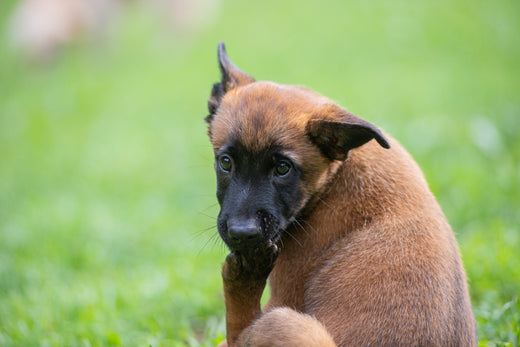
From cats and dogs to cows and lambs, animals licking themselves, their food, and humans is nothing new. Dog owners are more than used to seeing this kind of behavior in their pets. Dog licking paws is often an explorative or grooming behavior. An example of explorative behavior is puppies licking their surroundings to explore the world around them. Or dogs licking their paws after entering the house to groom themselves. But sometimes, excessive licking can indicate an underlying health issue. If you’ve observed that your dog is licking its paws more often than usual, it might signify something serious, especially if its licking is turning aggressive by the day. In this article we will cover the reasons for excessive paw licking and how to prevent it.
Reasons Why Dogs Lick Their Paws
1. Paw Injury
If your dog spends a healthy amount of time outdoors, paw injuries are bound to occur. An injury is most likely the cause if your dog is stubbornly licking only one of its paws. Causes of paw injury may include:- Stepping on sharp objects, hot pavements, or undiluted chemicals
- Being bitten or stung by an insect
- Embedded stones, splinters, or grass
- Arthritis
- Snow or de-icers
- Ligament sprains or fractures
- Bony growths
Paw injuries are very common among dogs, and the only way they know how to deal with them is to lick the affected area until it heals. If you suspect an injury is present, it’s best to take your dog to the vet. Make sure to follow all the vet’s orders to ensure proper healing. Regular paw checks and a consistent paw cleaning routine will allow you to detect and tend to injuries before they escalate into anything more serious.
2. Infection
Excessive paw licking may be due to irritation from a bacterial, fungal, or parasitic infection. This may occur after direct contact with the infectious agents or in response to an allergen. Such infections may also lead to abnormal growths such as cysts. These can be painful and irritating for the dog, resulting in excessive licking. Cysts can be difficult to deal with on your own, so make sure to schedule an appointment at the vet if you suspect that this is the cause of your dog’s excessive licking. Dogs with sweaty or wet paws are more susceptible to catching these infections. Their moisture-rich paws are the perfect environment for these agents to take shelter and multiply. Regardless of the cause, infections can make dog paws itchy and irritated, which leads to excessive licking. They are best diagnosed and dealt with by a veterinarian.
3. Dermatitis
Dermatitis or pododermatitis is a type of skin inflammation that can occur in reaction to an allergen. In this particular case, it is the skin of the paw that gets affected. Food and environmental allergies are common in dogs, and these often result in itchy paws. If the itching gets too much for your dog, it may aggressively lick its paws for some relief. You can narrow down your dog’s allergies since symptoms often occur directly after interaction with the allergen. Here are signs you should watch out for:
- Redness
- Inflamed skin
- Dark pigmentation
- Brown staining
If you think allergies are why your dog is licking its paws, the best option is to schedule a visit to the veterinarian. The allergy must be properly diagnosed so you can prevent future occurrences. Your vet will likely suggest eliminating certain foods from their diet, medication, and, in severe cases, avoiding certain environments.
Shop LuckyTail Allergy & Immunity Chews4. Nail Trauma
Nail trauma can relate to both nail overgrowth and injuries. Overgrown nails are painful for dogs as they obstruct proper movement. Luckily, the treatment is simple—just cut the nails! Overgrown nails are easy to identify since they extend beyond the paw pads and sometimes even curl. However, it gets trickier if your dog has dark nails. Check out our article on how to trim dog nails for more information. If you don’t feel confident trimming your pup’s nails, a dog nail grinder is a perfect tool for inexperienced groomers. Unlike nail clippers, a grinder trims nails gradually rather than in one cut, which is much safer for your dog and less stressful for you. Nail injuries in dogs are more common than you’d think. They include chipping, tearing, or breaking of nails, often caused by playing rough in outdoor environments. These injuries are easy to spot because they are usually visible and followed by bleeding or pain. Unfortunately, nail injuries can be very traumatic and painful because dogs’ nails contain small blood vessels that hurt when nicked. The best way to tend to these injuries is by cleaning and bandaging them and consulting a veterinarian.
5. Behavioral issues
Behavioral issues are another likely cause if everything else is out of the picture. They often will arise out of:- Boredom
- Fear
- Separation anxiety
- Stress
The reason for behavioral issues can be varied. For example, separation anxiety is a common occurrence in dogs left alone for too long. Fear can manifest from a lack of social exposure to other people or dogs. Boredom is common when dogs don’t feel mentally or physically stimulated. Stress can stem from a tense environment, boredom, fear, injury, or disease. When the cause of paw licking is so ambiguous, treating it can require a lot of time and patience from both the owner and the pup. You can try to tackle behavioral issues by distracting your dog with games and toys or schedule more walks to release pent-up energy. You can also keep boredom at bay by switching up their walk route, playtime, and routine frequently. If your dog exhibits aggressive behavioral tendencies, it is best to work with a professional dog trainer, veterinary behavior specialist, or animal behaviorist.
How to Stop Excessive Paw Licking?
If your dog won’t stop licking their paws, try not to get frustrated. There may be more than one cause for this type of behavior, some of which can be tended to at home, others may require you to schedule a visit to the veterinarian for a thorough checkup. If you suspect an issue such as infection or dermatitis, the best action is to visit a vet at the earliest. For issues such as injury or nail trauma, providing first aid before visiting the vet can relieve some of the itching. With behavioral issues, the problem may be your treatment of the dog, its environment, or adjustments in the household. Keep a close eye on your dog to investigate and tick off possible causes mentioned above.
